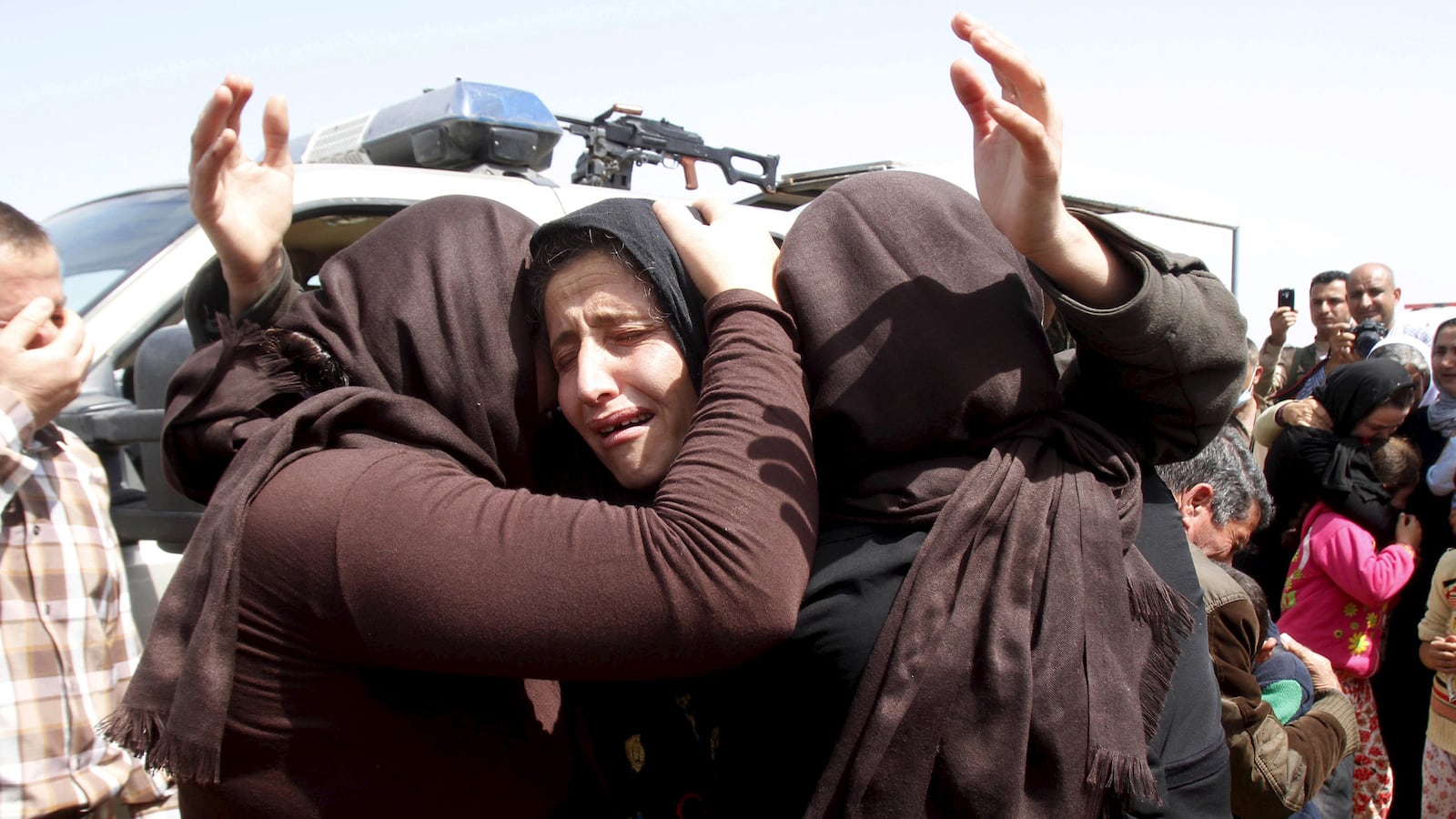ERBIL, Iraq — It’s been more than 50 years since a British journalist who came across a group of Belgian nuns in war-ravaged Congo was heard to shout, “Anyone here been raped and speaks English?” But the callousness of that line, made infamous as the title of a book by veteran correspondent Edward Behr, remains with us today. If anything, the reportorial cynicism and exploitation of the victims may be worse.
Iraqi and international journalists who have reported on Yazidi women and girls escaping from ISIS captivity have focused obsessively on slave markets, forced marriage, and rape.
I live in Iraqi Kurdistan, where I’ve met a number of these journalists, including those looking for contacts in the Yazidi community. When I ask journalists about their reasons for highlighting sexual violence, I hear different responses. Some claim that dramatic stories are the only way to grab people’s attention and to get them to care and react. One journalist told me that by getting the victim to talk, she was helping her to deal with her trauma and shame.
ISIS recently released another 216 Yazidis in Kirkuk, and women and children continue to flee, although those numbers have gone down significantly in the past few months. And journalists persist in finding those escaped victims to ask them about sexual violence they suffered in captivity, despite the fact that they are traumatized and may face retaliation or rejection if such details emerge.
Does the public’s interest in knowing explicit details of sexual violence outweigh these victims’ urgent need for safety and privacy? I don’t think so and there are indications that victims would agree.
In extreme cases, journalists have tricked victims into giving interviews. In its report “Escape from Hell,” Amnesty International tells the story of a woman who had requested medical assistance because she was having panic attacks. Instead of being taken into a doctor’s office, she was taken to a room full of journalists waiting to interview her.
In another reported case, a man who seems to have been a journalist but who claimed to be a doctor videotaped victims while telling them that he would not show their faces. The women reported to Amnesty International that the doctor advised them, “To cure our depression we should get out of the house and go for walks in the fields and sit in the sun.”
Many of the reports on Yazidi women and girls have focused overwhelmingly on details of sexual violence, although this was not the only form of abuse ISIS inflicted onto these victims. Nor was every prisoner raped.
One of the consequences of this obsessive reporting on rape has been that all of the escapees are now suspected by their families, community, and aid workers of having been raped while in captivity. They are all now collectively stigmatized and shamed.
Several television documentaries showed victims distraught and crying. Others revealed names and faces of victims, or a tattoo, headscarf or clothing that could identify them.
Iraqis have broadband Internet and satellite television and by broadcasting these images, journalists have compromised the safety and privacy of victims.
In February, NBC News published an article about aid workers helping Yazidi women who escaped from ISIS. In the middle of the article, NBC put the disclaimer, “NBC News does not usually identify victims of sexual assault, but obtained permission from the young women identified in this piece, as well as their current guardians.”
Why the double standard for victims overseas when this would never be allowed in the United States?
These victims are part of a conservative society where women and girls must maintain family honor by living according to rigid social and sexual traditions. In Iraqi society, one of the ways in which women and girls can lose their honor is if they are kidnapped and suspected of being raped. ISIS is using rape as a weapon of war against Yazidi women and girls ito dishonor the entire Yazidi community.
“We are just waiting to die,” two young women who had escaped from ISIS told me while I was meeting with them to apply for emergency funds. They had managed, with great difficulty, to avoid forced marriage and rape but still felt hopeless about their futures. Another young teenager I met was forced to marry a militant and escaped a month later. She did not feel safe and told me, “I am afraid of being kidnapped again. My ‘husband’ calls my relative’s phone looking for me.”
Many of these victims are now living scattered throughout Iraqi Kurdistan in tents and settlements of unfinished buildings. Everyone knows who they are and they are afraid to leave their dwellings, afraid that people will criticize them for having no honor.
When journalists go to conflict zones to report on sexual violence, under international media protocols they have an obligation to conduct ethical interviews. This includes taking into consideration the level of trauma the victim has suffered and what impact the interview will have. Applying ethical guidelines would go a long way towards preventing re-victimization and re-traumatization.
Journalists are not trained mental health workers, and are not equipped to deal with victims who manifest psychological symptoms during an interview. In Iraqi Kurdistan, journalists often refer cases to one another, pressuring victims to tell their stories over and over again. Every time a reporter asks a victim about her trauma, he or she reopens her wounds.
With the push by Iraqi and Coalition forces into ISIS controlled areas—most recently Tikrit—with reported plans to launch a campaign against the ISIS stronghold in Mosul, aid workers and communities are preparing for a new influx of displaced people. It is likely that more sexual assault victims will be among newly displaced populations since there are an estimated 2,500 to 3,000 still held captive.
International protocols that provide guidelines are being ignored, but it is not too late put safeguards in place to prevent abusive practices.
There are many resources to guide journalists reporting on sexual violence. Two comprehensive guidelines are found in “Media Guidelines for Reporting on Gender-Based Violence in Humanitarian Contexts” issued by the Global Protection Cluster chaired by the United Nations High Commissioner for Refugees (UNHCR); and the Dart Center for Journalism and Trauma’s “Best Practices in Trauma Reporting.”
Guidance is also found to a lesser extent in the Associated Press’s “News Values and Principles,” and the Council of Europe’s “Resolution 1003 on the Ethics of Journalism.” In Iraqi Kurdistan, a local agency, Mediawan, created a 10-point code of conduct that also provides a starting point for local media outlets.
Some things journalists can do to better protect the interests of victims in a conflict setting include using female interviewers and translators or at least having a woman present; conducting interviews in a confidential space outside of tents in camps; not pressuring victims to talk if they are uncomfortable; giving victims the right to end the interview; being non-judgmental; never revealing names, photographs, or facts that could identify victims; fully explaining who you are, who you work for and how the information will be used; gaining permission from the victim and her guardians if she is a minor; never asking victims if they were raped, or promising victims a reward in exchange for their stories.
Yazidi women and girls have a long and difficult road ahead of them. They risk being rejected by their families despite the fact that they are victims. They worry about being able to marry, and a lifetime of stigma. They cannot start to recover from their trauma until they are safe and have access to services. They find it difficult to move on when many have family members dead or still in captivity. Journalists play an important role in drawing attention to their plight, but it should not be at the expense of the safety and dignity of these victims.






